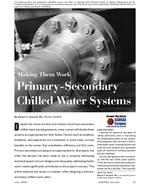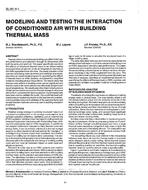The 2013 ASHRAE Handbook of Fundamentals contains six chapters under the heading “Load and Energy Calculations. ”The chapters include detailed information on aspects directly affecting building loads, load calculations and energy modeling. Chapter 19, titled, “Energy Estimating and ModelingMethods,” is authored by Technical Committee (TC) 4.7, Energy Calculations. The chapter introduction states, “Energy requirements of HVAC systems directly affect a buildings operating cost and indirectly affect the environment.” Due to these affects, energy analysis tools and programs have been developed by a number of public- and private-sector entities. This article examines the historical development of a private sector program: Trane Air Conditioning Economics (TRACE™).
In 1971, Dennis Bridges, manager of marketing at Trane1, and Neil Patterson, manager of applications engineering, conceptualized TRACE. To help with the implementation, theteam pulled in Dick Grant, an engineer familiar with both computer programming and HVAC design. The first release was based on the “Post Office Program.” The “Post OfficeProgram” was created in 1971 when the U.S. Postal Services developed a computer program to analyze energy use in post offices.2 In fact, according to Larry Scheier, lead software developer, there are still algorithms used in today’s version ofTRACE that use “PO” in the variable naming convention.
Citation: 2020 Winter Conference, Orlando, FL Technical Papers
Product Details
- Published:
- 2020
- Number of Pages:
- 4
- Units of Measure:
- Dual
- File Size:
- 1 file , 880 KB
- Product Code(s):
- D-OR-20-008


